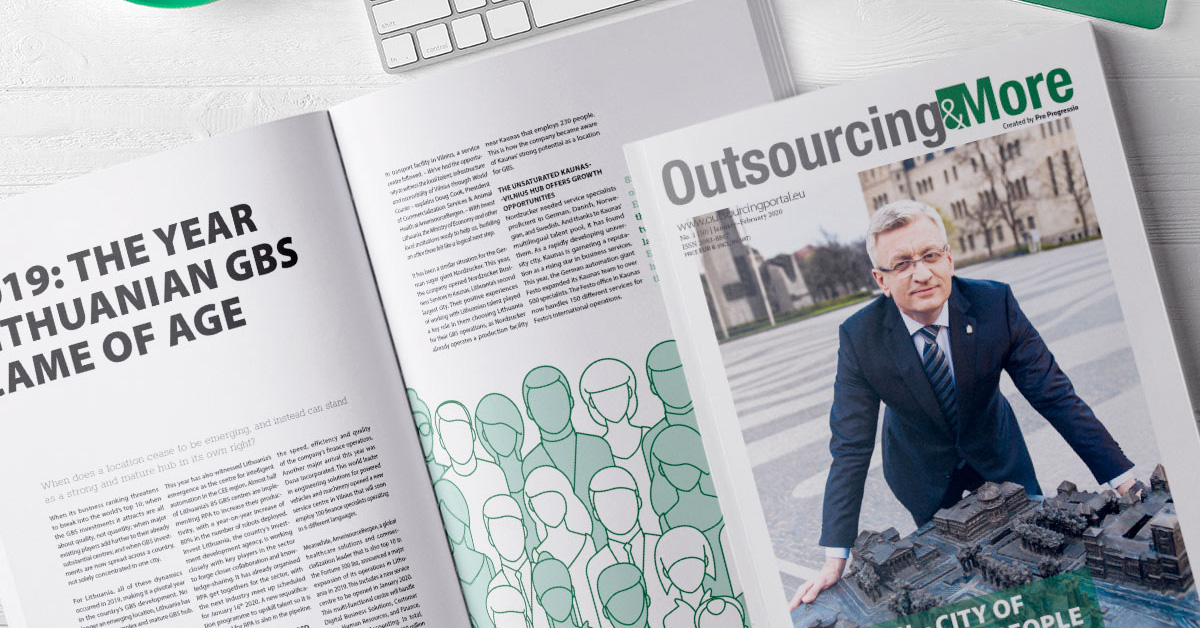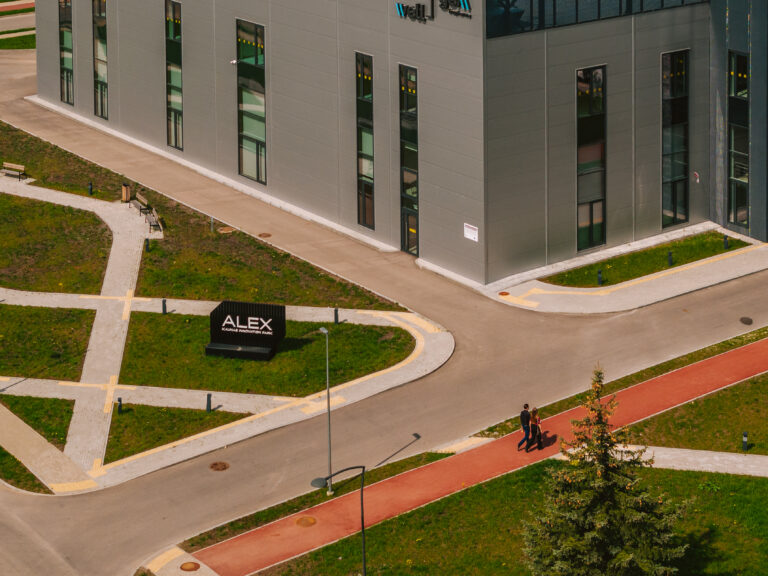The following article by Head of Business Services Team at Invest Lithuania Laisvis Makulis first appeared in the Outsourcing&More magazine. You can find the original here.
When does a location cease to be emerging, and instead can stand as a strong and mature hub in its own right? When its business ranking threatens to break into the world’s top 10; when the GBS investments it attracts are all about quality, not quantity; when major existing players add further to their already substantial centres; and when GBS investments are now spread across a country, not solely concentrated in one city.
For Lithuania, all of these dynamics occurred in 2019, making it a pivotal year in the country’s GBS development. No longer an emerging location, Lithuania has arrived as a complex and mature GBS hub.
11th in the world for doing business and a hub for RPA
2019 brought 8 new GBS investors to Lithuania, including a number of Fortune 500 companies. This means there are now 85 GBS centres in the country, employing almost 19,000 specialists. There are many factors that have convinced investors to choose Lithuania for their GBS operations. But in terms of overall performance, nothing tells the story of Lithuania’s rise to the top better than its ranking in the World Bank’s Ease of Doing Business index. By the end of 2019 Lithuania was rated the 11th best country in the world for ease of doing business – it has been steadily climbing the rankings for the last few years.
This year has also witnessed Lithuania’s emergence as the centre for intelligent automation in the CEE region. 50% of Lithuania’s 85 GBS centres are implementing RPA to increase their productivity, with a year-on-year increase of 80% in the number of robots deployed. Invest Lithuania, the country’s investment development agency, is working closely with key players in the sector to forge closer collaboration and knowledge-sharing. It has already organised RPA get togethers for the sector, with the next industry meet up scheduled for January 16th 2020. A new requalification programme to upskill talent so it is equipped for RPA is also in the pipeline.
New investors bring added value services
One noticeable trend in 2019, and a key sign of the sector’s maturation, has been the growth in high-end functions handled by Lithuanian GBS centres.
And this trend is being driven by Fortune 500 companies. McKesson corporation, a global leader in healthcare supply chain management that is ranked 7th in the Fortune 500 list, opened the McKesson Business Services Centre in Vilnius this July. Another major arrival this year was Dana Incorporated. This world leader in engineering solutions for powered vehicles and machinery opened a new service centre in Vilnius that will soon employ 100 finance specialists. Another major new investor from the engineering sector, Eisfeld Ingenieure AG, opened a GBS centre in Vilnius which is mainly composed of structural engineers working on the development of AI-based solutions.
Meanwhile, AmerisourceBergen, a global healthcare solutions and commercialization leader that is also top 10 in the Fortune 500 list, announced a major expansion of its operations in Lithuania in 2019. This includes a new service centre to be opened in January 2020. This multi-functional centre will handle Digital Business Solutions, Customer Care, Human Resources, and Finance, Treasury and Accounting. In total, the company plans to invest €30 million into the centre over the next 5 years, recruiting 200 specialists.
Positive initial experiences drive deeper investment
AmerisourceBergen’s development in Lithuania has followed an interesting trajectory. It already had a team in Lithuania through its speciality logistics arm, World Courier. And less than a year after World Courier opened its transport facility in Vilnius, a service centre followed. “We’ve had the opportunity to witness the local talent, infrastructure and accessibility of Vilnius through World Courier,” explains Doug Cook, President of Commercialization Services & Animal Health at AmerisourceBergen. “With Invest Lithuania, the Ministry of Economy and other local institutions ready to help us, building an office there felt like a logical next step.”
It has been a similar situation for the German sugar giant Nordzucker. This year, the company opened Nordzucker Business Services in Kaunas, Lithuania’s second largest city. Their positive experiences of working with Lithuanian talent played a key role in them choosing Lithuania for their GBS operations, as Nordzucker already operates a production facility near Kaunas that employs 230 people. This is how the company became aware of Kaunas’ strong potential as a location for GBS.
The unsaturated Kaunas-Vilnius hub offers growth opportunities
Nordzucker needed service specialists proficient in German, Danish, Norwegian, and Swedish. And thanks to Kaunas’ multilingual talent pool, it has found them. As a rapidly developing university city, Kaunas is garnering a reputation as a rising star in business services. This year, the German automation giant Festo expanded its Kaunas team to over 500 specialists. The Festo office in Kaunas now handles 150 different services for Festo’s international operations. Kaunas is also home to a major US healthcare solutions provider, R1 RCM (formerly Intermedix), which employs 500 staff in its GBS centre.
Despite being home to major universities, including the region’s largest technical university, Kaunas remains a very unsaturated location. At present, just 9.5 people per 1,000 are employed in the GBS sector in Kaunas. This compares to 83.5 people per 1,000 in Krakow, 70.6 in Wroclaw and 47.3 in Budapest. Vilnius also remains unsaturated by comparison, with a rate of 25.6 people per 1,000 employed in the sector. And thanks to the close proximity of Vilnius and Kaunas – the cities are just 100km apart and well connected by road and rail – investors in either city effectively have access to a talent pool of 1.4 million people, including 93,000 students.
This access to talent is not just attracting new investors, but also enabling existing centres to grow dramatically. Danske Bank’s GBS centre has now reached 3,600 employees. Another major player, Western Union, announced plans this year to add a further 300 specialists with skillsets in areas such as digital business and cross-border platform expansion, intelligent automation, compliance operations and business risk, to its already substantial Lithuanian operations. Western Union’s Vilnius centre currently employs 2,000 staff and offers services in 35 different languages.
Returning talent boosts capacity and multilingualism
The talent availability in Vilnius, Kaunas and the port city of Klaipeda is being strengthened by a trend that began in 2018 – the return of Lithuanian expats. This phenomenon, coupled with the continued ability of Lithuanian universities to attract more students from abroad, means a deeper talent pool than ever before.
This trend is also resulting in a highly multilingual and internationally-minded workforce. 85% of 25-34 year olds in Lithuania speak English, and over half the population speak two or more foreign languages. Besides English, German is highly popular, as are the Nordic languages. Unsurprisingly, almost 60% of GBS centres in Lithuania provide services in two or more languages, and the highest number of languages offered by a single centre is 35.
Lithuania targeting doubling of sector in the next 5 years
Having reached maturity, yet remaining far from saturated, the question of where GBS in Lithuania goes from here is an intriguing one. Invest Lithuania has a vision to double the GBS sector in the next 5 years. The agency has identified some critical areas that could drive this growth, which include strengthening of RPA competencies, an increasing focus on tech, and continued collaboration between universities and business.
Lithuania plans to leverage its high-end digital infrastructure and traditional strengths in science and technology subjects – it is ranked 3rd in the EU for STEM graduates – to attract high-end tech service centres specialised in areas like machine learning, digitization and cyber security. Furthermore, Lithuanian government is investing in a substantial retraining program aimed at re-skilling talent for IT and RPA services over the next 3 years.
Strong collaboration between universities and business will also be critical to the development of GBS in Lithuania. And universities are more than ready to bring investors in to help them tailor their programmes to meet the needs of innovative GBS centres. For example, Moody’s, the international credit rating agency, has announced plans for extensive cooperation with Lithuania’s leading management school, ISM. It will establish Moody’s Lab at the university, where students will be able to view and analyse data from the Moody’s database. The company will also sponsor ISM scholarships, and provide opportunities for Moody’s employees to gain Masters, PhD or MBA qualifications at ISM. In another example of the deep links between business and academia, Eisfeld Ingenieure is actively collaborating with Vilnius University and Vilnius Gediminas Technical University. “Our goal is to develop R&D projects in Lithuania from undergraduate to PhD level that are targeted to create AI-based solutions to automate structural design processes using Machine Learning techniques,” explains Professor Dr. Michael Eisfeld, CEO of Eisfeld Ingenieure.
Mature yet unsaturated, and with a clear vision for its further development, Lithuania is a GBS sweet spot that gives value to investors right now, while also offering strong potential for growth in the future.













